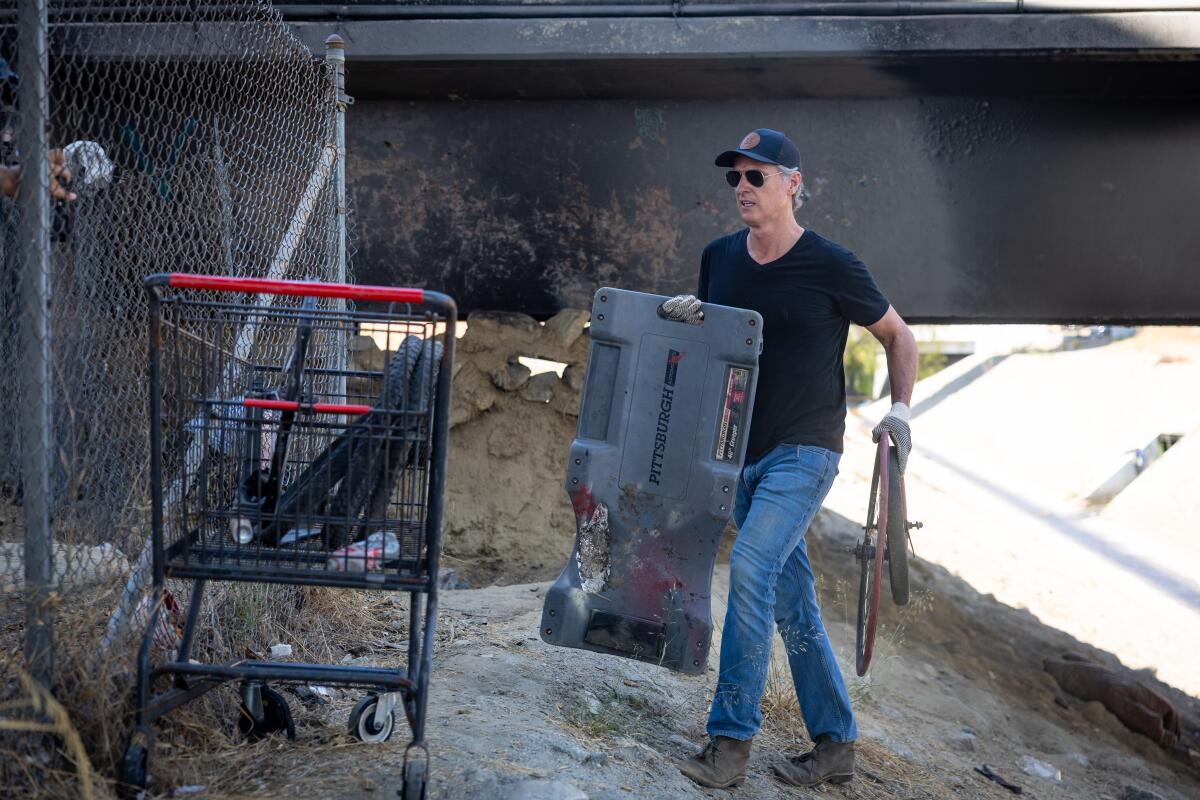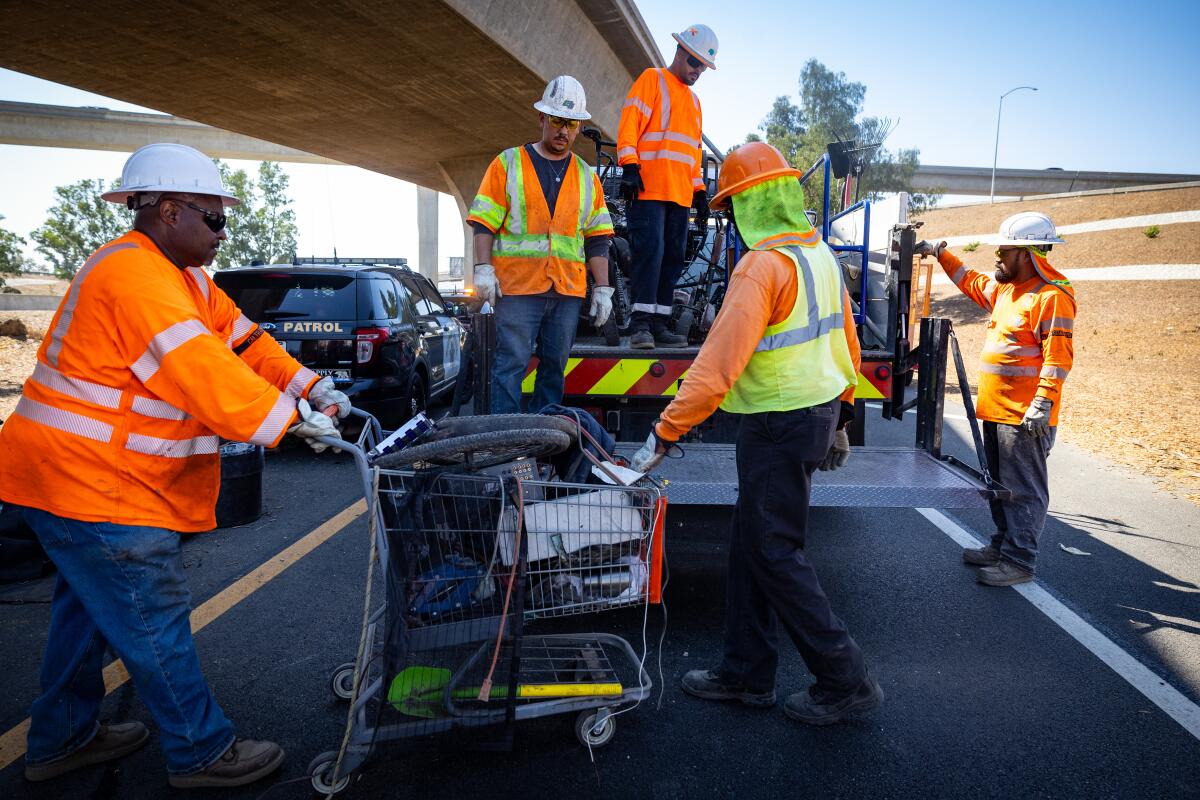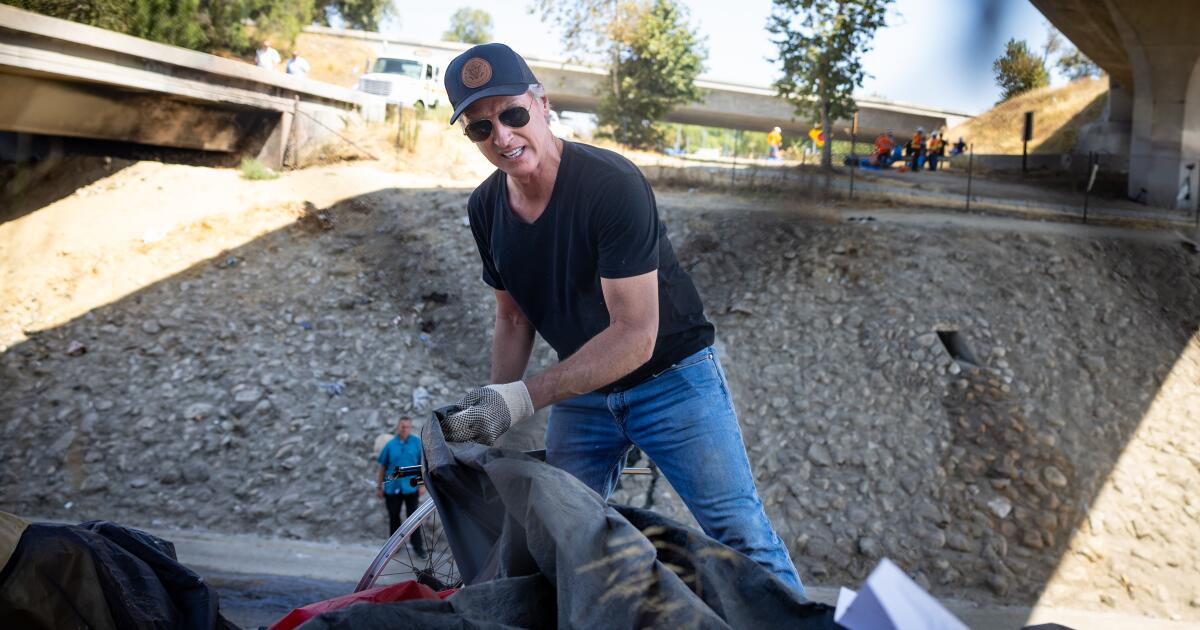With television cameras rolling and traffic on a busy San Fernando Valley freeway humming in the background, Gov. Gavin Newsom threatened on Thursday to take away state funding from counties that don’t show improvement on homelessness.
“If we don’t see demonstrable results, I’ll start to redirect money,” Newsom said.
“This is a sincerely held belief that we need local government to step up. This is a crisis. Act like it.”
Unbridled frustration from the Democratic governor over the lack of progress on his top issue — homelessness — isn’t new, nor is warning about stripping money from reluctant counties. As he nears the halfway point of his second and final term in office, Newsom is using his soapbox as governor to increase public pressure and lay blame on local leaders for California’s most glaring humanitarian crisis.
Los Angeles County, in particular, has become a frequent target of Newsom’s ire. The governor again criticized the county on Thursday for delaying implementation of a law that expands the criteria for people to be detained against their will.
Caltrans workers clean up another section of the homeless encampment near Paxton and Remick.
(Jason Armond / Los Angeles Times)
His trip to Pacoima came after his call to remove homeless encampments also appeared to fall on mostly deaf ears last month in Los Angeles, where elected officials criticized the order, or said it changed nothing in their policy approach. The governor’s executive order requires his administration to remove encampments on state property and urged cities and counties to do the same.
Mayor Karen Bass said “strategies that just move people along from one neighborhood to the next or give citations instead of housing do not work.” Los Angeles County Supervisor Lindsay Horvath said the county is already doing “urgent and humane encampment resolution.”
Two weeks later, Newsom arrived in a T-shirt, aviator sunglasses and a baseball cap with a California Department of Transportation crew to clean up encampments near an entrance to the 5 Freeway in Pacoima. The governor said he signed the executive order with “intention.”
“Folks may choose not to do anything differently,” Newsom said Thursday. “That’s a decision that could be made. Here’s what I get to decide. … If that’s the result, I’m going to redirect the money. It’s not complicated and I’m going to send it to people that actually want to get the job done.”
The governor and experts agree that the homelessness crisis is decades in the making, but opinions differ over whether Newsom’s more conservative policy approach and finger-pointing will help fix the issue. A dearth of affordable housing, low wages and the high cost of living are at the crux of a problem that has been exacerbated by mental health challenges and drug abuse.

“If this is not the most important issue, you’re not paying attention,” the governor said of homelessness.
(Jason Armond / Los Angeles Times)
The Newsom administration has spent more than $24 billion to clean up encampments, move Californians off the streets and sidewalks, and convert hotels and motels into temporary shelters, among dozens of other homelessness initiatives. The state has increased spending flexibility for local governments and given cities and counties more authority to force Californians into treatment under programs such as CARE Court and the expansion of conservatorships.
Proposition 1, Newsom’s ballot measure that voters narrowly approved in March, is expected to deliver more than $6 billion for 10,000 treatment and housing beds and expand care for drug addiction.
But Newsom’s policy approach to encampments and forced care have become points of contention between the governor and advocates for the unhoused, aligning him more with conservatives than progressives in his own party. The governor argues that he’s done his job and given cities and counties more funding, tools and authority to address the problem as they requested.
“There’s no more excuses,” Newsom said. “You’ve got the money. You’ve got the flexibility. You’ve got the green light. You’ve got the support from the state and the public is demanding it of you, and if this is not the most important issue, you’re not paying attention. This is the biggest scar on the reputation of the state of California.”
In June, Newsom praised a U.S. Supreme Court ruling that allowed Grants Pass, Ore. to enforce a law that banned camping in public places despite the city not having enough shelter to offer the people living in encampments.
Academics and homeless advocates cast Newsom’s encampment order, which followed the ruling, as a reaction to political pressure that could make the problem worse instead of offering a solution to help California’s most vulnerable residents.
“People can’t disappear themselves,” said Margot Kushel, a professor of medicine and the director of the Benioff Homelessness and Housing Initiative at UC San Francisco. “There is no easy way out of this. I have deep compassion for everybody’s frustration. I’m frustrated. I want this problem to be over. I understand this is unacceptable, but I think when you’re in a hole, you need to stop digging.”
Kushel and others described California’s fundamental problem as the shortage of affordable housing. The Newsom administration has spent a lot of funding on the problem of homelessness, Kushel said, but the state still isn’t building enough housing as the need continues to grow.
A state audit also found that California has failed to monitor the effectiveness of its costly homelessness programs, which raised questions about whether Newsom’s efforts are worth the price tag as the state grapples with a budget deficit. The governor has pushed for more accountability around how local governments use state dollars.
The state budget enacted in July broadens the responsibilities of a state Housing Accountability Unit to include oversight of state homelessness grants to cities and counties and adds more staff positions for the work. A separate bill, Assembly Bill 3093, seeks to require local governments to plan to build housing for all income levels, including homeless populations.
San José Mayor Matt Mahan applauded Newsom for focusing on improving accountability.

State transportation crews take part in the cleanup.
(Jason Armond / Los Angeles Times)
Mahan said the development of more affordable housing is critically important, but it takes too long and costs too much to immediately address the problem. San José has focused on using state and federal funding to offer interim and transitional housing communities to provide “a ladder off the streets.”
Last month, Newsom informed San Diego County of the state’s intent to reclaim a $10-million grant to build 150 tiny units for lack of action and redirect the funds to San José.
Mahan said he backs the idea of a statewide framework with set targets and specific goals for local governments to build shelter and treatment for its homeless residents.
“I think it will get us out of the fantasy land of thinking that we can prioritize solutions that will work if we just happen to have another $100 billion,” Mahan said.
